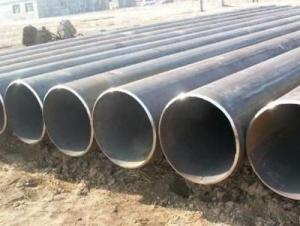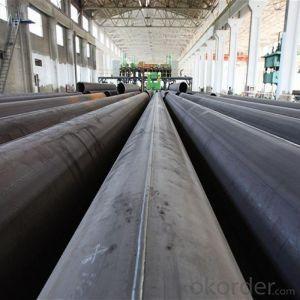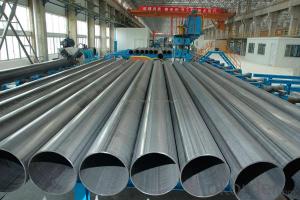LSAW STEEL PIPE 6'' API 5L
- Loading Port:
- China Main Port
- Payment Terms:
- TT OR LC
- Min Order Qty:
- -
- Supply Capability:
- -
OKorder Service Pledge
OKorder Financial Service
You Might Also Like
Packaging & Delivery
Packaging Detail: | Normal exporting packing,in container or bulk vessel or as per clients' request |
Delivery Detail: | 2 months after confimed contract |
Specifications
Large Diameter API 5L X70 PSL2 LSAW Steel Pipe
Grade: X42, X46, X50, X52, X60, B, C
OD: 1.5"-28"
WT: SCH10-SCH160
Brand:TPCO
Large Diameter API 5L X70 PSL2 LSAW Steel Pipe
Specifications:
u Standard: API 5L
u Grade: B, C, X42, X46, X50, X52, X56, X60, X65, X70, X80
u OD: 1.5"-28"
u WT: SCH10-SCH160
u Length: 5-12m
u Ends Finish: plain end, bevel end, grooved end
u Surface Treatment: bare, black varnished, oiled finish, red color, anti-corrosion, 3PE, FBE or epoxy coating
u Technique: hot rolled or cold drawn
u Application: api 5l steel pipe for conveying oil, water, gas
u Invoicing: based on theoretical weight or actual weight
u Payment Terms: L/C at sight, T/T or Western Union
u Trade Terms: FOB, CFR, CIF
u Certification: ABS manufacturing assessment, ABS design assessment, API 5CT, API 5L, DNV manufacturer certificate, ISO9001 quality management system certificate, ISO14001 environment management system certificate, GB/T28001 occupational health and safety management system certificate, A1 class manufacturing license of special equipment certificate, CCS, GL, LR, SGS, TüV, PDE
- Q:How long do steel pipes last?
- There are several factors that can influence the lifespan of steel pipes. These factors include the quality of the steel used, the installation environment, and the maintenance and care provided to the pipes. Steel pipes are generally recognized for their durability and long life. When properly installed and regularly maintained, steel pipes can endure for many decades, sometimes even surpassing 50 years. However, it is important to consider external factors that can greatly impact their lifespan, such as corrosion, exposure to extreme temperatures, and chemical reactions. To ensure the reliability and functionality of steel pipes for an extended period, it is crucial to conduct regular inspections, make timely repairs, and apply protective coatings.
- Q:What are the advantages of using steel pipes in construction?
- There are several advantages of using steel pipes in construction. Firstly, steel pipes are incredibly strong and durable, providing excellent structural integrity and long-term reliability. They can withstand high pressure and heavy loads, making them suitable for various applications such as water and gas transportation, oil pipelines, and building frameworks. Secondly, steel pipes have a high resistance to corrosion, which ensures longevity and reduces maintenance costs. Additionally, steel pipes are versatile and can be easily customized to meet specific project requirements, as they come in various sizes, shapes, and thicknesses. Lastly, steel pipes are environmentally friendly, as they are recyclable, reducing the overall carbon footprint of construction projects.
- Q:What is a flange and how is it used in steel pipes?
- A flange is a mechanical joint used to connect two sections of steel pipes or other equipment together. It consists of a ring or plate with evenly spaced holes for bolts or welding. Flanges are used in steel pipes to provide a secure and leak-proof connection. They allow for easy assembly and disassembly of pipes, as well as provide a connection point for additional components like valves, fittings, or other pipe accessories.
- Q:Are steel pipes suitable for use in nuclear power plants?
- Yes, steel pipes are suitable for use in nuclear power plants. They are commonly used in various systems such as cooling, steam, and reactor coolant systems due to their high strength, durability, and resistance to corrosion. Additionally, steel pipes can withstand the high pressure and temperature conditions present in nuclear power plants, making them a reliable choice for this critical infrastructure.
- Q:Are steel pipes suitable for use in pharmaceutical industries?
- Yes, steel pipes are suitable for use in pharmaceutical industries. They are commonly used in pharmaceutical manufacturing processes as they offer excellent corrosion resistance, durability, and cleanliness. Additionally, steel pipes can withstand high pressure and temperature conditions required for sterilization and the transportation of various pharmaceutical liquids and gases.
- Q:Seamless steel pipe and welded pipe what is the difference?
- The welded pipe is made directly from the stainless steel band by machine, and it is made of round steel or perforated by Guan Pi
- Q:Can steel pipes be used for underground sewage systems?
- Yes, steel pipes can be used for underground sewage systems. Steel pipes have high strength and durability, making them suitable for carrying sewage and withstanding the pressure and environmental conditions underground. Additionally, steel pipes have excellent corrosion resistance properties, which is crucial for sewage systems that are exposed to moisture and various chemicals.
- Q:What are the different methods of pipe cutting for steel pipes?
- There exists a variety of techniques for cutting steel pipes, each tailored to specific circumstances and demands. Some of the most prevalent techniques are as follows: 1. Manual Pipe Cutters: These handheld tools are frequently employed for cutting smaller steel pipes. They typically feature a rotating cutting wheel that gradually creates a groove until the pipe is severed. Portable and relatively user-friendly, manual pipe cutters are suitable for on-site cutting tasks. 2. Hacksaw: The use of a hacksaw is a traditional and cost-effective means of cutting steel pipes. This method requires physical exertion and time; however, it can effectively cut pipes with smaller diameters. It is crucial to use a fine-toothed blade and apply steady pressure to ensure a clean and precise cut. 3. Reciprocating Saw: Also known as a sawzall, the reciprocating saw is a power tool that employs a back-and-forth cutting motion to swiftly and efficiently cut through steel pipes. These versatile saws can accommodate different types of blades to handle various pipe sizes and thicknesses. 4. Band Saw: Band saws are commonly employed in industrial settings for the purpose of cutting large steel pipes. These saws feature a continuous loop of teethed metal blade that moves on wheels, enabling precise and rapid cutting. Band saws are ideal for cutting large-diameter pipes and can be operated manually or fully automated for high-volume cutting tasks. 5. Pipe Cutting Machines: Pipe cutting machines are often utilized to achieve precise and consistent cuts. These machines are designed to cut steel pipes swiftly and accurately, making them suitable for large-scale industrial applications. Depending on the machine and requirements, various cutting methods like abrasive cutting, flame cutting, or plasma cutting can be employed. It is important to note that the selection of a pipe cutting method depends on factors such as pipe diameter, thickness, location, precision requirements, and available resources. It is imperative to adhere to proper safety precautions when working with any cutting method to prevent injury or damage to the pipes.
- Q:How are steel pipes protected during transportation?
- Steel pipes are protected during transportation through a variety of measures to ensure their safety and integrity. One common method is the use of protective coatings on the exterior of the pipes. These coatings, such as epoxy or polyethylene, serve as a barrier against external factors like moisture, corrosion, and physical damage. Additionally, the pipes are often bundled together and secured with strapping or bands to prevent movement and potential collisions during transit. In some cases, pipes may also be placed within wooden crates or containers for added protection against impact and handling. Furthermore, careful loading and unloading procedures are followed to minimize any stress or strain on the pipes. By implementing these protective measures, steel pipes can safely reach their destination without compromising their quality or structural integrity.
- Q:What is the difference between seamless and welded steel pipes?
- The main difference between seamless and welded steel pipes lies in their manufacturing process. Seamless pipes are made by piercing a solid billet of steel, while welded pipes are formed by rolling steel sheets and then welding them together. This difference in production methods results in varying levels of strength, durability, and cost. Seamless pipes are generally stronger and more reliable, as they have no welded seams that can weaken the pipe. However, they are also more expensive to produce. On the other hand, welded pipes are more cost-effective but may have weaker points at the welded seams. Ultimately, the choice between seamless and welded steel pipes depends on the specific application and requirements of the project.
1. Manufacturer Overview |
|
|---|---|
| Location | |
| Year Established | |
| Annual Output Value | |
| Main Markets | |
| Company Certifications | |
2. Manufacturer Certificates |
|
|---|---|
| a) Certification Name | |
| Range | |
| Reference | |
| Validity Period | |
3. Manufacturer Capability |
|
|---|---|
| a)Trade Capacity | |
| Nearest Port | |
| Export Percentage | |
| No.of Employees in Trade Department | |
| Language Spoken: | |
| b)Factory Information | |
| Factory Size: | |
| No. of Production Lines | |
| Contract Manufacturing | |
| Product Price Range | |
Send your message to us
LSAW STEEL PIPE 6'' API 5L
- Loading Port:
- China Main Port
- Payment Terms:
- TT OR LC
- Min Order Qty:
- -
- Supply Capability:
- -
OKorder Service Pledge
OKorder Financial Service
Similar products
New products
Hot products
Related keywords































